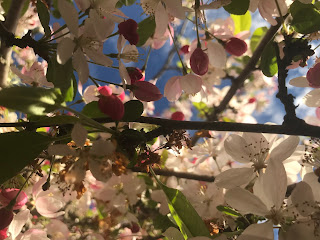“Not infrequently, training course participants call attention to ‘the danger of conscientizaçao’ in a way which reveals their own fear of freedom. Critical consciousness, they say, is anarchic.”
––Paulo Freire
Pedagogy of the Oppressed
There are voices I’m meant to keep with me, insights to hold as I embark on a seven-month long pedagogical journey to identify best practices for teaching incarcerated college students and anyone else my rural community college campus serves. These are the people of the forgotten and more impoverished southern Silicon Valley. Our students, like any students, hope to earn certificates, transfer to four-year institutions, or more fundamentally still, learn about the world, their place in it, and the potential each holds for transformation, creation, and how to best establish safety at a time when life is uncertain for many.
"Why teach using different cultural practices?" someone urges me to find the answer. "What are barriers to experiencing our authenticity?" asked another. Such questions emerged during brainstorming sessions I facilitated during the final weeks of the spring semester. I gathered tutors, teachers, and incarcerated and non-incarcerated students alike to anonymously frame questions and remind me of what to keep in mind as I explore four pedagogical approaches:
- Social Justice and Liberation Pedagogy
- Trauma Informed and Safety Seeking Frameworks.
- Improvisation and Play
- Mindfulness and Contemplation
You need to include more Latina activists, someone wrote. Remember to teach courage is the virtue that validates all others, wrote someone else. Personal stories are powerful and motivating, says a fifth.
Each idea is expressed on a single post-it note. They clung, one to another, like flower petals, a riot of color in unruly clumps that settled at the bottom of the canvas bag within which I carried all this thought. It awaited organization and order, which I dreamed would appear come summer when I had the time to put each idea into place.
"What is the best way for trauma-effected people to learn trust?" they asked. "How much support does it take?" "How long?" "How can the scars of history help us appreciate the present?" "How does a teacher’s whiteness impact what happens in a classroom?" "Is it easier for students to enter conversations about race through a gender lens?" "What resources are available for helping facilitate anti-oppression activities?" "What do we say to those who don’t want to think in these terms?" "Is it OK to get up and move around during class?"
The college where I’ve been teaching English for 18 years has gifted me with this opportunity to explore these diverse and inter-related approaches, approaches that have shaped my teaching to lesser and greater degrees over the last two decades but within which I have never truly felt entirely grounded.
My purpose is two-fold: to gain insight into best practices and program possibilities for the college’s inmate education program and to learn more about establishing good learning foundations for students who will be enrolling in our transfer level English classes, without the remediation we are used to providing. Our California state funders will no longer support the old model and now every community college is required to accept almost every student at the transfer level within the first year.
To answer the questions my sabbatical has generated and meet its objectives, I’ll visit other California community colleges, prison programs, and culturally rich community based projects and museums across the country. I’ll interview educators and experts who are leading voices in understanding how the ethnic, class, and gender identities of students and teachers alike affect classrooms, creativity, self-expression, and success. I’ll attend dance, improvisation, and mindfulness conferences and workshops to gain insight into the relationship between the mind, the body, and learning, and I’ll read and re-read books such as Freire’s Pedagogy of the Oppressed(which provided the epigraph above) as well as Gilda Ochoa’s Academic Profiling: Latinos, Asian Americans, and the Achievement Gap, and Robin DiAngelo’s White Fragility: Why It’s So Hard for White People to Talk About Racism.
My plan is to post what I learn here. Perhaps along the way you’ll want to share your own insights and questions, which will further enrich this anarchic exploration. With that in mind, let the image of this blank post-it note be your inspiration.
Share your ideas and your voice, too, will be one I keep with me as I journey.













